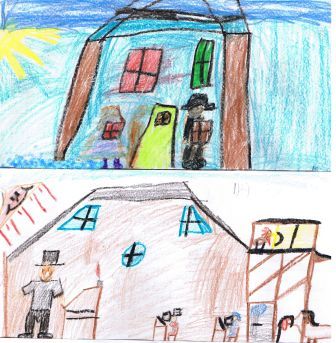S.K. schools hear from Biomes Marine Biology Center and the Narragansett Bay Research Reserve
By Rebecca J. Briggs, CLP Reporter
What do marine biologist Mark Hall and environmental scientist Jennifer West have in common? For starters,
 they both recently presented to S.K. elementary schools’ Community Learning Program. They also share an appreciation and fascination for wildlife that began in grade school, and led them both to study science URI. They now are both research scientists, committed to educating others on their discoveries.
they both recently presented to S.K. elementary schools’ Community Learning Program. They also share an appreciation and fascination for wildlife that began in grade school, and led them both to study science URI. They now are both research scientists, committed to educating others on their discoveries.“When I was young, I was very interested in the animals I saw in the wild—how they lived, how they protected themselves, how they found their food.” So began Mark Hall of Biomes, southern New England's only private aquarium and education center in North Kingstown and online at http://www.biomescenter.com/. “I discovered early on that by keenly observing animals in their habitats, I could learn how they survived, and that by staying in school, I could develop the skills I needed to go on to college, and become a scientist.”
 Mark held up a fist-sized butterfly fish, a ‘tropical stray’ that he found while scuba diving off Block Island. He queried his 1st through 5th grade audience, “Why do you think there is a black stripe across the fish’s head? Why is it so skinny? Why is its head so pointy?” Pausing to allow students time to observe, he continued, “The answers to these questions are clues to how the fish protects itself and gets its food.”
Mark held up a fist-sized butterfly fish, a ‘tropical stray’ that he found while scuba diving off Block Island. He queried his 1st through 5th grade audience, “Why do you think there is a black stripe across the fish’s head? Why is it so skinny? Why is its head so pointy?” Pausing to allow students time to observe, he continued, “The answers to these questions are clues to how the fish protects itself and gets its food.”“Do you think this fish is native to RI waters? How do you think it got here—do you think it can survive in Narragansett Bay?” An astute fifth-grader answered, “I think the fish would die because it gets too cold in the winter here.” Indeed, it would: this stray was just the size of a quarter when it was carried to the North Atlantic on a strong tropical current, “just like a stray dog a long way from home.”
“It is skinny,” Mark explained, “so that it can squeeze into rock cracks where other fish don’t go. And it’s striped in order to confuse predators as to where its eyeball is.” Ah… discovery—boy, observing wildlife is cool!
Mark emphasized that his knowledge of marine biology has given him a greater understanding of land animals as well, (and this explained his next specimen, an abandoned boa constrictor!).
So, too, did Jen West’s graduate work in environmental education lead to her knowledge of wildlife.
 Narragansett Bay’s estuaries—where rivers meet the sea—have become her “living laboratory.” There she studies and counts fish, monitors how salt marshes filter pollutants, and researches human effects on natural ecosystems.
Narragansett Bay’s estuaries—where rivers meet the sea—have become her “living laboratory.” There she studies and counts fish, monitors how salt marshes filter pollutants, and researches human effects on natural ecosystems.Estuaries are critical to tens of thousands of wildlife habitats. Their bordering wetlands are key to water quality, flood protection and water storage. Estuaries also have enormous recreational, educational, aesthetic, and commercial value.
“When we build a lot, ecological cycles change. For example, increased human population leads to more invasive plants, and fewer natural wildfires. Fires help native plants like the pitch pine to spread their seeds; instead, invasive plants compete with the natives that are the natural habitat for resident animal and fish species.” Moreover, when we build, “water can’t filter through the pavement or the rooftops, and toxic run-off enters the watershed and pollutes estuaries.” This is the basis for the stormwater projects that Jen coordinates as the Coastal Training Coordinator for the
 Narragansett Bay National Estuarine Research Reserve.
Narragansett Bay National Estuarine Research Reserve.Science has vast reaches and interconnections. As Mark and Jennifer agreed, “You can do a lot of good for society and nature when working in the field of science.” Jen invited students to practice being scientists at the Prudence Island research reserve out in the middle of Narragansett Bay. To schedule school trips year-round and find lesson plans and other resources, visit http://www.nbnerr.org/.
As the CLP program continues on into the winter, a big thank you goes to former Matunuck parent, Rian Smith, for organizing the biweekly Monday presentations. Rian works diligently with Matunuck Principal Deb Zepp…
Mrs. Zepp also should be congratulated for her calm and courage, as she steadily held ‘Reggie,’ Biomes’ boa
 constrictor, in front of Matunuck’s 300 wildly cheering students. All were relieved to hear Mark’s reply to fourth-grader Anthony Maine: “Has Reggie the Boa ever tried to constrict you?” “No. Boas are very, very strong, but the only reason they constrict is to hold on to something like a tree in the rainforest.” With that, Principal Zepp gracefully transferred Reggie from her shoulders back to Biomes’ chief scientist. Whew! Keep up the good work, CLP!
constrictor, in front of Matunuck’s 300 wildly cheering students. All were relieved to hear Mark’s reply to fourth-grader Anthony Maine: “Has Reggie the Boa ever tried to constrict you?” “No. Boas are very, very strong, but the only reason they constrict is to hold on to something like a tree in the rainforest.” With that, Principal Zepp gracefully transferred Reggie from her shoulders back to Biomes’ chief scientist. Whew! Keep up the good work, CLP!



